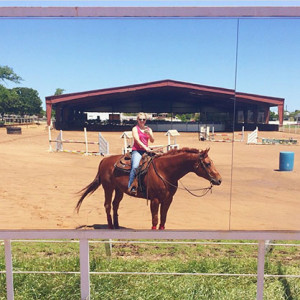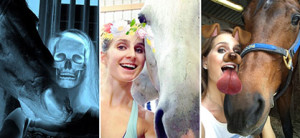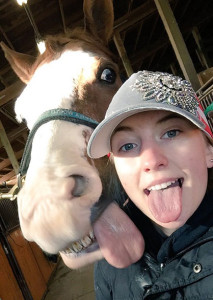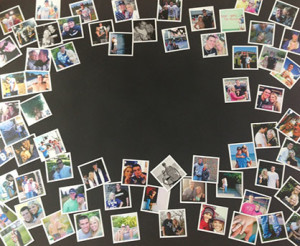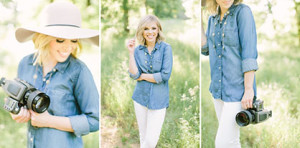5 Tips For the Perfect Horse Selfie
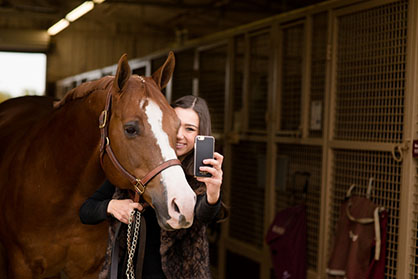
A selfie taken at the end of a barn aisle to utilize “directional light.” Image courtesy of Kirstie Marie Photography.
The Self Portrait: Equine Edition
By: Kirstie Marie Jones
Over the past several years, cell phone “selfies” have become a popular way to immortalize daily moments in our lives. It’s often said, “If you want to learn what someone fears losing, watch what they photograph.” Naturally, equestrians include horses in their selfies as a way to document their adventures at the barn, at horse shows, on trail rides, and during special, quiet moments.
Below are several tips for self-portraits that include equines:
Light
The Greek roots of the word “photography” is “phos,” which means light and “graphi,” which means write or drawing. Put those two words together and they create a powerful word picture of “writing with light.” Light is the single most important element in any photograph, and soft light is the key ingredient to powerful imagery.
For every self-portrait, you want to find the most flattering light. Follow any social media master and you will see selfies taken from the front seat of a car. There is a reason for this – cars produce directional light. There are “walls” that cast shadows on either side of the face, and the main light source comes streaming in from the front windshield. The shadows on either side add depth in lighting. Soft shadows are critical because they accentuate the directional light source. The light coming from the front then illuminates your skin smoothly and evenly.
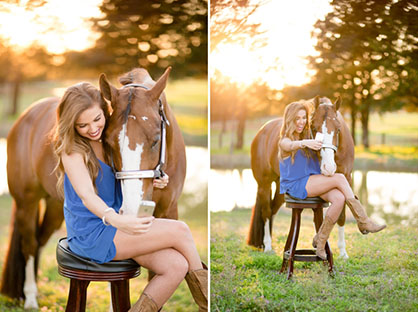
A selfie taken with the sun behind the subjects to utilize “back lighting.” Image courtesy of Kirstie Marie Photography.
Because it’s difficult to fit your horse inside a car, directional light can be also be found inside a doorway entrance (barn aisle). It’s important that you don’t let the sun hit your face directly, but you stay in the shade and set the exposure on your face. On an iPhone, you can set the exposure by tapping on your face.
If you’re outside, try taking photographs in either the shade, or full sun, to avoid harsh shadows. Make sure that both you and your horse are evenly lit so the camera can properly expose the subjects. If the sun is about to set, you can even turn yourselves around to get the sun behind you. This technique is known as “back lighting.” Back lighting can be tricky, so make sure your heads completely cover the sun, so you don’t get washed out by too much light.
Composition
It can be hard – sometimes impossible – to fit a horse’s head into a self-portrait without the use of a selfie stick. Some people try to get creative by using different angles, but don’t be afraid to crop areas out. You can take a selfie of your feet with your horse’s hooves, your hands on his neck, your smile with his muzzle, or your eye with his eye.
If you’re trying to get both faces in the image, try holding your iPhone with one hand and releasing the shutter by hitting one of the volume buttons. This can help you keep the camera steady. In order to include both bodies in the image, find your reflection in a mirror, body of water, glass, window, or your shadow.
Connection
Interaction with your horse speaks volumes in a photograph. When you place your hands on your horse’s face, try to keep your fingers together and rest your hand softly so your fingers don’t look like talons. If you rest your head on your horse, lean in with your forehead/temples first and don’t put much weight on him. If you need to get your horse’s ears forward, try throwing objects in the air, kicking up some rocks, or placing food (bucket of grain, handful of alfalfa, package of horse treats) in front of him. Sometimes, the trick to a perfect selfie is perfect timing.
Editing
Personally, my favorite apps to edit cell phone images are Afterlight and VSCO. Selfies with Snapchat filters are also popular.
Archiving
You can’t trust posting images to social media sites as a safe place for long-term storage. I always back up my iPhone photos by archiving to the Dropbox app (iCloud storage and the Box app work similarly). If you want to print your art, Social Print Studio is a quick and easy way to turn your selfies into prints of any size and variety.
Kirstie Jones owns Kirstie Marie Photography, a fine art equine photography studio located in Dallas, Texas. You may recognize many of her images as they regularly appear within the pages of The Equine Chronicle.











